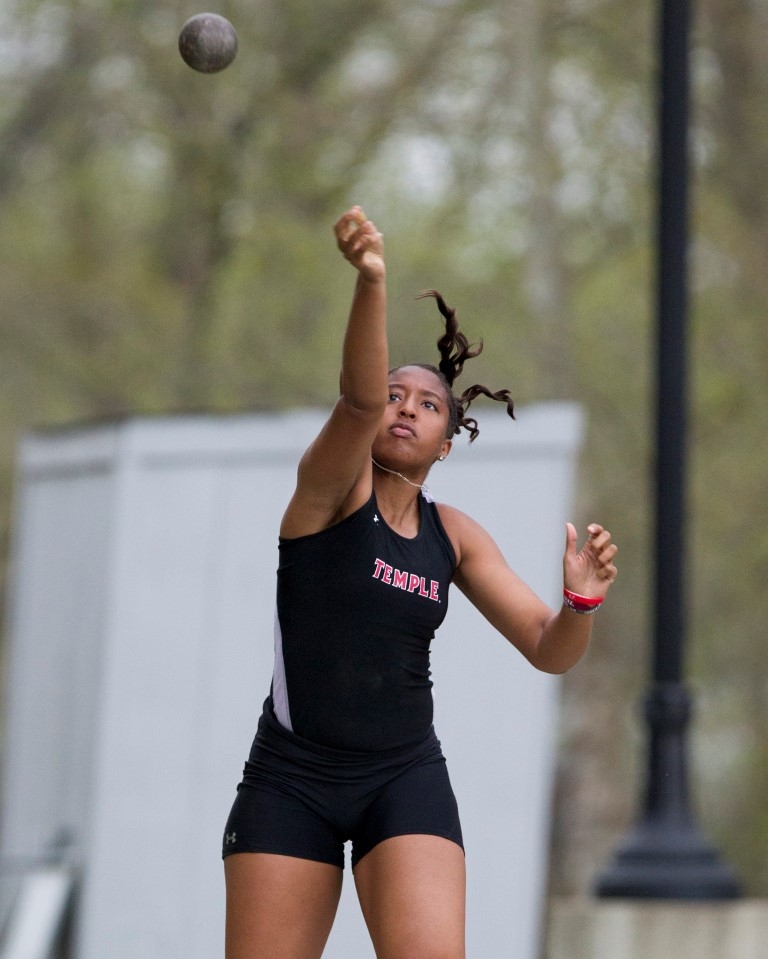Temple track and field's Jenni Abercrumbie: 'Tell me I can't and I'll show you I can'
Jennifer Abercrumbie, a member of Temple's track and field team, is a living example of the folly of stereotyping student-athletes. The off-the-field accomplishments of this theoretical linguistics major in the College of Health Professions and Social Work had graduate schools and employers competing for her (she was accepted to grad school programs at Harvard University and the University of California, Berkeley, and also was offered a prestigious post-graduate internship with the NCAA). Want to know what Jenni chose? Read on.
Temple Times: What's the most annoying stereotype you hear about student-athletes?
Jenni Abercrumbie: The most common stereotype that I've encountered is the entitled dumb jock persona. That has always been one that I've wanted to make evaporate whenever possible. Growing up, my mom was always a big proponent of education. If my grades started to slip, I was not attending practice. So many things can go wrong that can take sports away from you; you need something to fall back on. You need something to keep you sane when your coaches are driving you crazy. Education has always been my outlet.
TT: What have you learned from participating in intercollegiate athletics?
JA: Teamwork. People forget that cross country and track are team-oriented. As an athlete, I've been surrounded by upwards of 100 teammates. I depend on them for practice, I depend on them in meets. It's not just me out there by myself. Members of teams learn to balance each other's strengths and weaknesses. You have one common goal. In a workplace environment, I'm going to depend on other people too.
TT: Looking back on your years at Temple, is there something that stands out as a defining experience?
JA: I think the one thing I'll hold on to most is my experience as president of our Student Athlete Advisory Committee. It was very rewarding. The NCAA mandates that institutions have a SAAC so that student-athletes have a voice on campus and the athletics administration and student-athletes work together to make sure that the wellbeing of the student-athletes is being taken care of. Before I took over as SAAC president in my junior year, it wasn't recognized as a student organization. Student-athletes needed to be more integrated into university culture. So we've branched out and done more community service projects. People see that we have brains, we have goals, we have initiatives and we want to do something to give back to our community, our fans and the university.
TT: Track and field coach Eric Mobley told us you originally came here as a distance runner, not a thrower. What happened?
JA: I originally ran cross country in the fall, and then during the outdoor track season I ran the 800 and 1500. In my sophomore year at practice, I was running downhill at Belmont Plateau [in Fairmount Park]; my foot got caught in an awkward position and my hips came out of alignment. I was able to walk it off, but the problem kept coming back. For about two and a half months it stayed out of alignment. I eventually had to go through physical therapy for a month and a half. It was either that or surgery. I was not able to lift, I wasn't able to run. I was barely able to walk or sit up straight in class.
TT: What was the worst part of that time?
JA: I was on an island. It was rough, especially being so far from home. I found out that I needed other people. I get energy from others — that's what makes me work hard, whether it's sports or drama or an honor society.
TT: But you didn't leave the team?
JA: I worked my butt off and was able to practice with my team again by the end of my sophomore year. But it didn't feel right. I knew that I wasn't going to contribute to my team or score points in that condition. But one benefit of the injury was after I was able to do squats again, I was stronger than ever. We realized I have this natural knack for using my hips. I knew that if I wanted to be a part of the team, I needed to find another way to contribute. So I became a thrower. My main event is javelin — I have always thought javelin was cool. I also do hammer throw and shot put. The team didn't have many throwers at the time. So why not?
TT: What's next for you?
JA: I have decided to attend U.C. Berkeley in the fall and get my master's degree in their sport and education program in their School of Education.
TT: Do you have any long term goals?
JA: I'm taking over the NCAA! [She laughs.] I don't see why I couldn't. I already know some people after participating in an NCAA inclusion forum earlier this month. I want to stay close to student-athletes and impact their lives, so my long-term goal is to be an athletic director or dean of students at an institution.
TT: Speaking of inclusion, there aren't many African-American female role models nationally in those types of leadership positions.
JA: Tell me I can't and I'll show you I can. The fact that there are few women period, let alone African-American women, who are in the types of positions I want — that's a driving force. There's a saying: Be the change you want to see in the world. If I don't try, how can I inspire someone else? How can I tell someone else they can do it, if I don't try myself?
